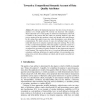Free Online Productivity Tools
i2Speak
i2Symbol
i2OCR
iTex2Img
iWeb2Print
iWeb2Shot
i2Type
iPdf2Split
iPdf2Merge
i2Bopomofo
i2Arabic
i2Style
i2Image
i2PDF
iLatex2Rtf
Sci2ools
133
click to vote
ER
2008
Springer
2008
Springer
Towards a Compositional Semantic Account of Data Quality Attributes
We address the fundamental question: what does it mean for data in a database to be of high quality? We motivate our discussion with examples, where traditional views on data quality are found to be unsatisfactory. Our work is founded on the premise that data values are primarily linguistic signs that convey meaning from their producer to their user through senses and referents. In this setting, data quality issues arise when discrepancies occur during this communication. We sketch a theory of senses for individual values in a relational table based on its semantics expressed using some ontology. We use this to offer a compositional approach, where data quality is expressed in terms of a variety of primitive relationships among values and their senses. We evaluate our approach by accounting for quality attributes in other frameworks proposed in the literature. This exercise allows us to (i) reveal and differentiate multiple, sometimes conflicting, definitions of a quality attribute, (i...
Related Content
| Added | 19 Oct 2010 |
| Updated | 19 Oct 2010 |
| Type | Conference |
| Year | 2008 |
| Where | ER |
| Authors | Lei Jiang, Alexander Borgida, John Mylopoulos |
Comments (0)

